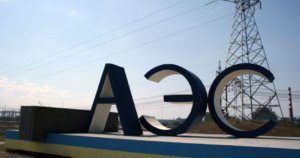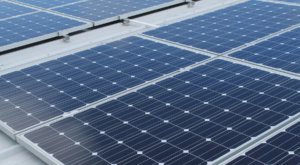
State-owned enterprise Energoatom in January-June 2018 saw net profit rise by almost 2 times compared to the same period last year, to UAH 3.186 billion. According to reporting on the website of the generating company, its net income in the first half of the year increased by 1.1%, to UAH 20.747 billion, while gross profit decreased by 1.8%, to UAH 5.166 billion.
As reported, Energoatom in 2017 received a net loss of UAH 1.322 billion against UAH 232.791 million of net profit for 2016. Net income in 2017 increased by 6.7%, to UAH 38.488 billion, while gross profit decreased by 16.7%, to UAH 4.773 billion.
Energoatom is the operator of all four operating NPPs in Ukraine. It operates 15 power units equipped with VVER reactors with a total installed capacity of 13.835 GW.

The Slovenian company Riko in August this year will begin the construction of a solar power plant with a capacity of 10.6 MW near Zhytomyr, mayor of the regional center Serhiy Sukhomlin, who signed a contract with director of the Slovenian company Janez Skrabec, has said. “The plant will be built near the village of Hlybochytsia on a plot of 18 hectares. It is planned to complete the work by August 2019 … Special thanks to the members of the government of the Republic of Slovenia for the issue of EUR3 million grant funds for this project,” Sukhomlin wrote on Facebook.
He noted this is the second project that Riko will implement in Zhytomyr: previously Slovenia won a tender for the reconstruction of the drinking water pumping station of municipal enterprise Zhytomyrvodokanal.
Deputy Prime Minister, Minister of Regional Development, Construction, Housing and Utilities Services of Ukraine Hennadiy Zubko, in turn, congratulated Zhytomyr with the launch of such an ambitious project and expressed belief that the city has all chances to become Ukraine’s first city having its own solar power plant. “Financing the project: credit facilities plus financial support from the government of Slovenia plus city guarantees,” Zubko wrote on his Facebook page. He also noted that the future effect for Zhytomyr is about EUR1.65 million of additional revenue per year, and also the reduction in carbon dioxide emissions.

Kyiv-based Lavina Mall LLC, the owner of the Lavina Mall shopping and entertainment center, in January-June 2018 saw UAH 184.2 million of net profit compared with net loss of UAH 83 million a year ago. According to a company’s report, net revenue grew 2.3-fold, to UAH 316.7 million.
Gross profit quintupled, to UAH 196 million, and the company saw a 3.7-fold rise in operating profit, to UAH 256.7 million.
Uncovered loss in H1 2018 fell by 47%, to UAH 164.8 million.
Total bills receivable over the period grew by 31%, to UAH 671 million.
Noncurrent liabilities grew by 5%, to UAH 1..73 billion, and current liabilities fell by 17%, to UAH 833.8 million.
Lavina Mall was opened early December 2016.
Developer of Lavina Mall was Megaline (Kyiv).